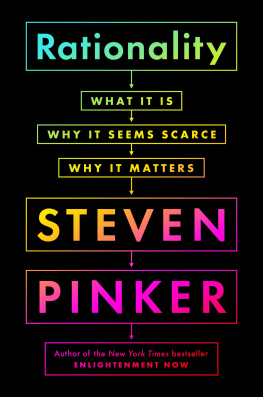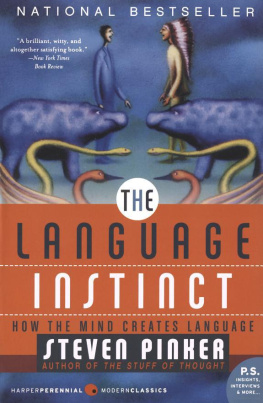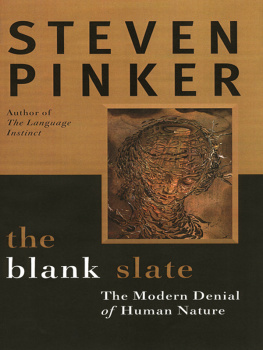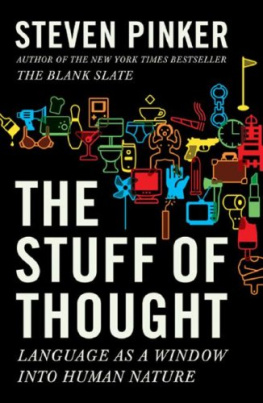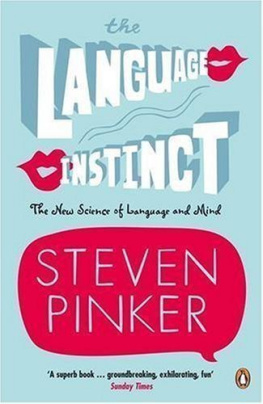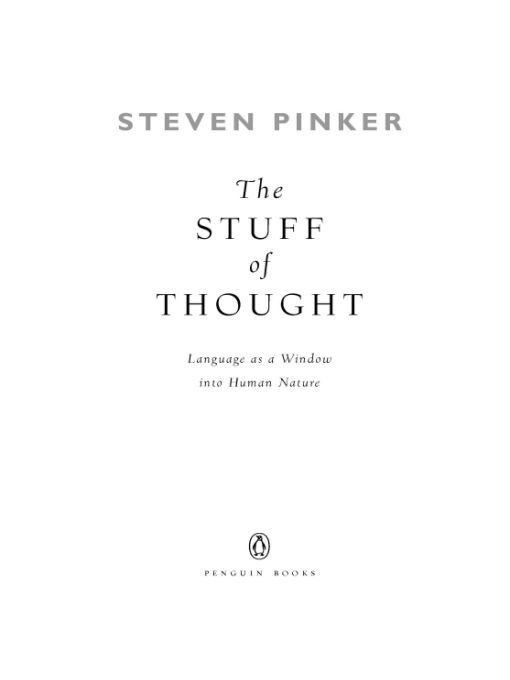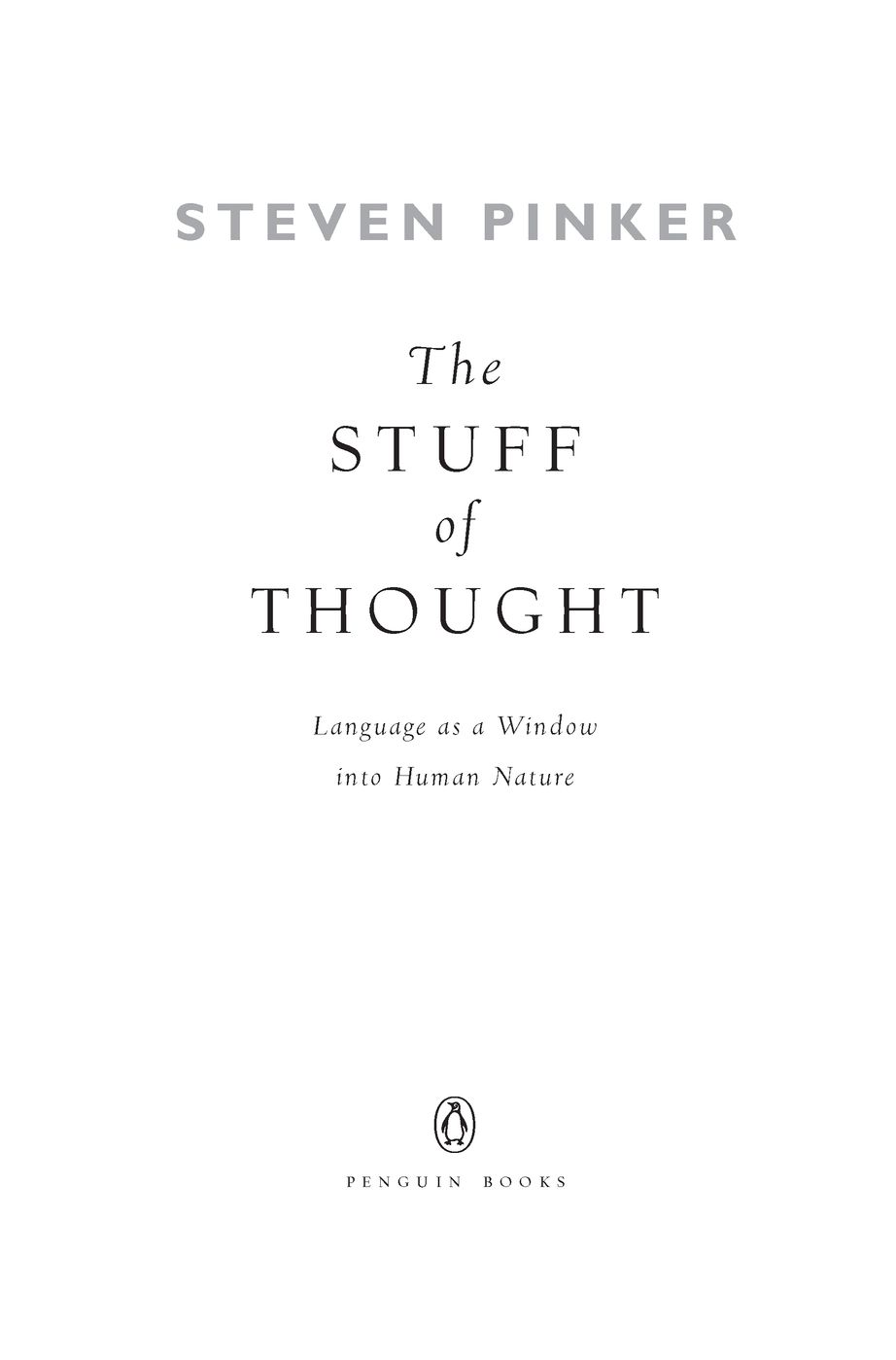Table of Contents
Praise for The Stuff of Thought by Steven Pinker
Pinker brings an engaging and witty style to the study of subject matter thatwere it not as important to us as it is complexmight otherwise be off-putting.... An inviting and important book. Everyone with an interest in language and how it gets to be how it isthat is, everyone interested in how we get to be human and do our human businessshould read The Stuff of Thought.
Robin Lakoff, Science
Packed with information, clear, witty, attractively written, and generally persuasive... [Pinker] is unfailingly engaging to read, with his aptly chosen cartoons, his amusing examples, and his bracing theoretical rigor.
Colin McGinn, The New York Review of Books
Engaging and provocative... filled with humor and fun. Its good to have a mind as lively and limpid as his bringing the ideas of cognitive science to the public while clarifying them for his scientific colleagues.
Douglas Hofstadter, Los Angeles Times
Pinker is not only wonderfully clear; he is also blessedly witty. Theres plenty of stuff to think about in The Stuff of Thought, but a lot of fun stuff too.
George Scialabba, The Boston Globe
An excellent window not only into human nature but into Pinkers nature: curious, inventive, fearless, naughty.
William Saletan, The New York Times Book Review
[Pinker] is the cognitive philosopher of our generation, and his work on language and mind has implications for anybody interested in human expression and experience.... [He] has changed the way we understand where we have come from and where we are going.
Seth Lerer, The New York Sun
A fascinating look at how language provides a window into the deepest functioning of the human brain.
Josie Glausiusz, Wired
A perceptive, amusing and intelligent book.
Douglas Johnstone, The Times (London)
This is Steven Pinker at his besttheoretical insight combined with clear illustration and elegant research summary, presented throughout with an endearing wit and linguistic creativity which has become his hallmark. Metaphor, he says, with typical Pinkerian panache, provides us with a way to eff the ineffable. The book requires steady concentration, but despite the abstract character of its subject matter it is not difficult to read. That is Pinkers genius. He effs like no other.
David Crystal, Financial Times
Immensely readable and stimulating.
David Papineau, The Independent on Sunday
Illuminating and astonishingly readable.
Robert Hanks, Sunday Telegraph (London)
The Stuff of Thought delivers the same rewards as Pinkers earlier books for a general audience. He has a very good eye for the apt example, the memorable quote, and the joke that nails the point; he is lucid in explanation and vigorous in argument.... The Stuff of Thought [has] the two most important qualities in a good popular science book: it makes the subject accessible, and it makes its readers think.
Deborah Camerson, The Guardian (London)
The pleasure of Pinkers book is in watching the careful skill with which he peels back the linguistic layers that clothe those models. The whole performance brought to my mind (very Pinkerishly, I now see) those elaborate colored diagrams in anatomy textbooks, in which you can leaf through successive transparencies to remove the skin, musculature, and organs to reveal at last the skeleton.... Like [Pinkers other books], it breathes the spirit of good-natured, rational, humane inquiry.
John Derbyshire, American Conservative
[A] brilliant book.
Emma Garman, Huffington Post
A cracking read.
Shane Hegarty, The Irish Times
I recommend the book as highly as I can recommend any book, without reservation. Buy it. And read it. Youll find yourself educated and entertained at the same time.
S. Abbas Raza, 3 Quarks Daily
A spicy stew.
Chris Scott, The Globe and Mail (Toronto)
Its sheer range is astonishing. If you wish to know why metaphors are both inescapable and inadequate, why and how people swear, how English expresses concepts of space and time, or why we often avoid saying what we mean, I find it hard to imagine a better guide. As always, Pinker displays an apparently effortless talent for illuminating complex ideas with pointed, witty examples.... He has fun with ideas and draws ideas from fun. An impressive achievement, all in all, on many levels.
Mark Abley, Montreal Gazette
[An] awesome combination of analytical and imaginative thinking... Pinker writes lucidly and elegantly, and leavens the text with scores of perfectly judged anecdotes, jokes, cartoons, and illustrations.
Rita Carter, Daily Mail
Pinker is fascinating, authoritative, intense. His book is packed with ideas that have been fully thought out and carefully rendered to prompt us each to marvel at the determinants of human nature.
Anne Brataas, Star Tribune (Minneapolis)
A fascinating explanation of how we think and why we do what we do.... While you might have to wrap your brain around tenses, Extreme Nativism, and polysemy before you can figure out why youre constantly swearing like a drunken sailor, its abso-fucking-lutely worth it.
Courtney Ferguson, The Portland Mercury
The Stuff of Thought is an excellent book... easily his most accessible and fun book to read... [and] on a scientific level, the book does something quite amazing: it bridges the chasm that many academics have over language itself.
Daniel Schneider, Monsters and Critics
[A] stimulating volume... From politics to poetry, childrens wonderful malapropisms to slang, Pinkers fluency in the nuances of words and syntax serves as proof of his faith in language as a window into human nature.
Donna Seamon, Booklist
A book on semantics may not sound especially enticing, but with Pinker as your guide, pondering what the meaning of is is can be mesmerizing.
Details
ABOUT THE AUTHOR
Steven Pinker is the Johnstone Family Professor of Psychology and Harvard College Professor at Harvard University. He is the author of seven books, including The Language Instinct, How the Mind Works, Words and Rules, and The Blank Slate. He lives in Boston and Truro, Massachusetts.
For Rebecca
PREFACE
There is a theory of space and time embedded in the way we use words. There is a theory of matter and a theory of causality, too. Our language has a model of sex in it (actually, two models), and conceptions of intimacy and power and fairness. Divinity, degradation, and danger are also ingrained in our mother tongue, together with a conception of well-being and a philosophy of free will. These conceptions vary in their details from language to language, but their overall logic is the same. They add up to a distinctively human model of reality, which differs in major ways from the objective understanding of reality eked out by our best science and logic. Though these ideas are woven into language, their roots are deeper than language itself. They lay out the ground rules for how we understand our surroundings, how we assign credit and blame to our fellows, and how we negotiate our relationships with them. A close look at our speechour conversations, our jokes, our curses, our legal disputes, the names we give our babiescan therefore give us insight into who we are.


